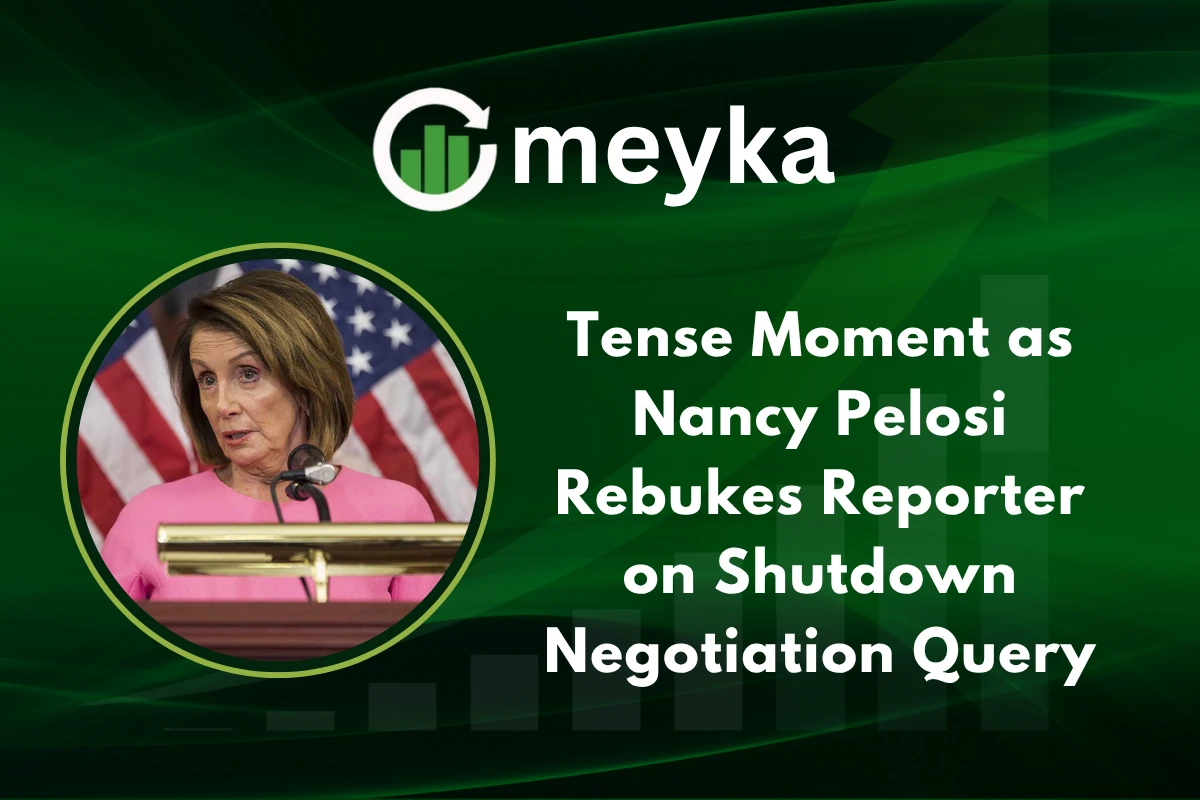Tense Moment as Nancy Pelosi Rebukes Reporter on Shutdown Negotiation Query
Nancy Pelosi faced a tense moment with a reporter while discussing ongoing government shutdown talks. The exchange occurred after questions about whether Rep. Alexandria Ocasio-Cortez was leading negotiations to reopen the government. Pelosi quickly corrected the reporter, emphasizing that House Minority Leader Hakeem Jeffries was in charge.
The interaction underscores the high stakes in Congress as both Democrats and Republicans navigate the shutdown crisis. Pelosi’s response reflects the pressure on leaders to maintain unity and clarity while managing public perception amid a politically charged standoff.
Nancy Pelosi and the Shutdown Talks
What Sparked the Tense Exchange?
The clash happened after a reporter asked if Ocasio-Cortez was directing negotiations with the GOP to end the shutdown. Pelosi responded sharply: “Why are you saying such a ridiculous thing?” This moment drew immediate attention online. The query touched on internal Democratic strategy during a sensitive Congress negotiations period.
Why did Pelosi snap back? She aimed to clarify leadership roles and maintain focus on the official negotiators rather than informal channels.
Pelosi’s Position on the Shutdown Stalemate
Pelosi highlighted that Hakeem Jeffries is leading efforts to reopen the government. She emphasized caucus unity and experience as essential in managing the shutdown crisis.
Pelosi acknowledged Ocasio-Cortez’s public statements but stressed the importance of coordinated negotiations through official leadership channels.
Reporter’s Question That Triggered Pelosi’s Rebuke
Why the Question Was Controversial
The reporter suggested that Ocasio-Cortez was driving talks with Republicans. This portrayal conflicted with Pelosi’s message about party leadership and strategic negotiation.
Publicly assigning a negotiation lead to a single progressive lawmaker risked creating confusion among constituents and media outlets.
Pelosi’s Firm Response in Context
Pelosi clarified that negotiations were led by House Democrats through Jeffries, noting the experience and unity required in such high-stakes situations. She positioned the rebuke as a defense of institutional processes over media speculation.
What was the reporter asking? The reporter implied Ocasio-Cortez directed shutdown negotiations, which Pelosi immediately corrected.
Political Reactions and Public Response
What Democrats Are Saying
Many Democrats supported Pelosi’s response, emphasizing that leadership should manage negotiations with Republicans. Party members noted that clarity and coordination are critical amid the GOP standoff and ongoing shutdown crisis.
GOP Reaction to Pelosi’s Comment
Republicans highlighted the exchange as evidence of internal Democratic tension. Some suggested the rebuke reflected disagreements within the caucus over negotiation strategies.
Social Media Buzz
The exchange sparked online discussion. On X, Ocasio-Cortez wrote:
“If Republicans want to blame their shutdown on me, they are more than welcome to come to my office and negotiate anytime.”
This statement further fueled debate on how public messaging intersects with official negotiations.
Media Coverage and Analysis
How Outlets Like Yahoo News and CBS Reported It
CBS News reported that Pelosi firmly redirected attention to Jeffries as the lead negotiator. Yahoo News highlighted the tense tone of the exchange and its significance in the broader government shutdown talks. Media outlets framed the rebuke as a moment of leadership under pressure.
Why This Exchange Matters for Public Perception
The incident demonstrates how leaders manage both media scrutiny and internal party dynamics. Pelosi’s rebuke was a signal to constituents and lawmakers that official processes take precedence over informal speculation.
Why did Pelosi react this way? She wanted to maintain clarity on negotiation leadership and protect the Democratic caucus’s credibility.
Broader Impact on Shutdown Negotiations
Pelosi’s Leadership in Crisis Moments
Pelosi’s handling of the exchange reinforces her role in steering House Democrats through a politically volatile environment. Her firm response indicates the importance of centralized leadership during negotiation stalemates.
What This Means for Future Congressional Talks
The incident may influence how reporters frame questions in the future. It also signals that shutdown negotiations will proceed under defined leadership, with unity and coordinated messaging prioritized over individual actions.
Who is leading the shutdown negotiations? House Minority Leader Hakeem Jeffries is officially managing talks with Republicans.
Did Pelosi criticize Ocasio-Cortez? No, Pelosi recognized Ocasio-Cortez’s input but emphasized that she is not directing negotiations.
Why did this moment gain attention? The exchange highlights tensions during a politically sensitive shutdown and the need for clear leadership communication.
Conclusion
The tense rebuke by Nancy Pelosi illustrates the pressures leaders face during high-stakes government shutdown talks. Her correction reinforced that official negotiation channels, led by experienced lawmakers, remain the cornerstone of managing the shutdown crisis.
For Congress and the public, the incident underscores the importance of unity, accurate reporting, and clarity in politically charged moments. As negotiations continue, Pelosi’s leadership approach will likely remain central to Democratic strategy and public messaging.
FAQ’S
Nancy Pelosi is an American politician and longtime Democratic leader who served as the first female Speaker of the House in U.S. history.
Speaker emerita is an honorary title given to a former Speaker of the House, recognizing their service and leadership after leaving the role.
Yes, Nancy Pelosi is married to Paul Pelosi, a businessman, and they have been together for decades.
A retired professor is often called Professor Emeritus or Professor Emerita, a title that honors their academic contributions.
Yes, the Speaker of the House can be removed through a vote by the members of the House, typically via a motion to vacate.
The current Speaker of the House in 2025 is determined by the majority party’s vote at the start of the congressional session.
Disclaimer
This article is for informational purposes only and does not constitute financial advice.






